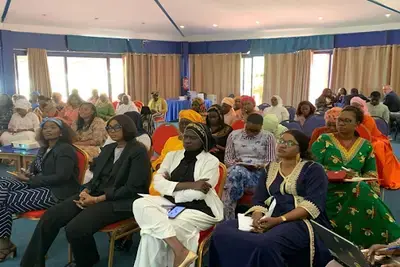
Former President of Liberia Ellen Johnson Sirleaf and Hon. Helen Kuyembeh, a former member of Parliament of Sierra Leone, with NEW Politics participants.
Success Story
More Women, Better Politics
NDI and the Mano River Union Secretariat are working with a group of 32 young women political activists from Cote d’Ivoire, Guinea, Liberia, and Sierra Leone to chart a course towards a new politics -- a politics in which women have a strong voice. The Network of Emerging Women in Politics (NEW Politics) program is designed to help women develop confidence, networks, and other skills needed to more fully engage in the political arena and achieve greater representation.
The NEW Politics program, supported by the National Endowment for Democracy, incorporates training, practical experience, and mentoring, starting with a “boot camp” for all participants in Monrovia, Liberia. This program builds on a 2017 NDI program in Liberia, Getting Ready to Lead, expanding it to build a network of aspiring young women political leaders across the Mano River region of West Africa. In Monrovia, sessions focused on leadership skills, confidence-building, campaign planning, messaging, voter targeting, presentation, building a public persona, and more. During a practical exercise, participants developed campaign plans to increase women's representation in politics, and later developed messages for their own campaigns, featuring taglines like "More women, better politics. Better politics, more women."
As women gathered in Monrovia to begin the program, it was clear they were ready to get to work. The Liberia delegation set the tone, planning a surprise greeting for the other women when they arrived in Monrovia. They held "Welcome" and "Bienvenue" signs, embraced their new colleagues - all from different walks of life, different political parties, different communities, different countries, and different languages - and formed instant bonds and networks.
Despite their differences, many of the women had a few things in common. First, during the very first session of the week, participants were asked to name three people they viewed as leaders. One after another, the women identified Ellen Johnson Sirleaf, the former president of Liberia and the first woman to be elected president in Africa.
Second, a practice exercise asking the women to tell their own stories revealed many of the challenges young women face in politics, pointing to the underlying purpose of programs like NEW Politics. One young woman shared that she was physically attacked when she launched her campaign - because she was a woman. Another spoke about attacks by party members who associated her with the opposition due to her perceived ethnicity. These stories are a reminder of their bravery, and why joining together and sharing expertise is essential toward achieving greater inclusion.
One young woman, who has polio, described how she painstakingly crafts papier-mâché beads and strings them on necklaces that she sells to raise campaign funds. Facing overwhelming discrimination, she is driven to run for political office to represent those in the "polio camp" in which she lives in Sierra Leone. She is fighting for improved policies for disabled persons and to show her fellow citizens that "disability is not inability".
Another young woman, who brought her 3-month old baby with her to Monrovia so that she could nurse her, thanked everyone for their support and assistance. Throughout the week, the women took turns cradling the baby so its mother could actively participate in the trainings. The young mother implored the group to spread the message that babies and children should not stand in the way of women's participation.
As women shared their experiences, becoming role models to one another, their original inspiration, President Sirleaf herself, joined the group on the last day of the program for a panel discussion on personal paths to political office. President Sirleaf's story demonstrates that while the path ahead may not be easy, the groundwork has been laid for women's leadership in the region. She told participants the journey to leadership is a long one, with peaks and valleys, successes and failures. She urged the women to commit to this journey to create a new and better politics.
Now that the first phase of the training is over, the network will continue to meet and develop capstone projects to carry forward what they learned in Monrovia. Ultimately, these women will change the face of politics in their communities, bringing greater diversity of experiences, ideologies, and ideas. More women, better politics!



